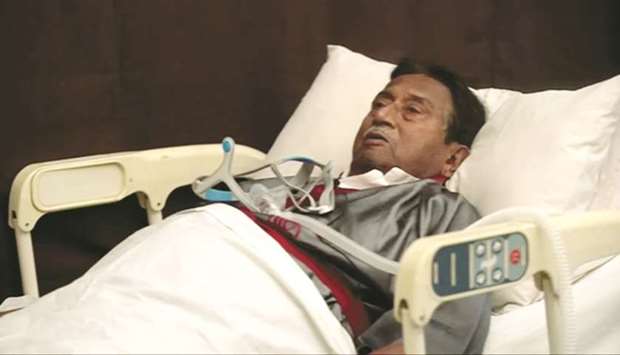The Pakistan government said yesterday that it is seeking to disbar the leader of a three-judge panel which ruled that the corpse of former military ruler Pervez Musharraf should hang for three days if the general dies before his execution.
The special court sentenced Musharraf, 76, to death on Tuesday after finding him guilty of high treason for subverting the constitution in 2007.
He took power in a 1999 coup.
The court directed law enforcers to apprehend Musharraf, currently receiving medical treatment in Dubai, to ensure the death sentence is carried out.
However, if found dead beforehand, “his corpse (should) be dragged to D-Chowk, Islamabad, Pakistan, and be hanged for three days”, it said.
The chowk, or square, is just outside parliament.
Yesterday’s bizarre announcement came after the government said it had found “gaps and weaknesses” in the original sentence, apparently taking sides in a split between the military and the judiciary, and the general’s lawyers said Musharraf planned to appeal.
Legal experts termed the instructions unconstitutional, even if symbolic.
Law Minister Mohamed Farogh Naseem said the government is seeking to remove the leader of the three-judge panel.
The judge, Waqar Ahmad Seth, had violated judicial conduct, he said.
“Our plea is that such a judge has got no authority to be a judge of any high court or the Supreme Court,” he said. “He is unfit.”
Escalating the tension with the judiciary, the army spokesman said the court announcement proved his assertion that the original sentence was flawed.
“Today’s decision, particularly the wording used in it, is beyond humanity, religion, civilisation or any values,” he told a news conference.
He said that army chief General Qamar Javed Bajwa had taken up the issue with Prime Minister Imran Khan.
The prime minister has stayed largely quiet on the ruling.
The original sentence had already shocked the military, which has ruled Pakistan for about half the country’s history.
The army accused the court of ignoring legal processes and defended Musharraf’s patriotism.
Attorney-General Anwar Mansoor Khan has said that Musharraf was not given a fair trial, taking the army line.
Tensions between the military and the judiciary rose after the Supreme Court struck down a three-year extension of service given by the government to army chief Bajwa.
Musharraf, who was tried and sentenced in absentia, said in Dubai that the charges against him were politically motivated.
He seized power in a coup in 1999 and later ruled as president.
In November 2007, Musharraf suspended the constitution and imposed emergency rule, prompting protests.
He resigned in 2008 to avoid the threat of impeachment.
When Nawaz Sharif, whom Musharraf deposed in 1999, was re-elected prime minister in 2013, he initiated a treason trial against Musharraf, and in 2014 he was charged with high treason.
“This case was taken up only due to a personal vendetta by some people against me,” Musharraf said in a video statement from his hospital bed in Dubai.
The frail-looking former military ruler said that he remained undecided on his next move or whether his legal team was planning to appeal.
Musharraf travelled to Dubai after a travel ban was lifted in 2016 and he has refused to appear before the court, despite multiple orders.
The general became a vital American ally in the “war on terror” after the September 11, 2001 attacks and escaped at least three Al Qaeda assassination attempts during his nine years in office.
His rule faced no serious challenges until he tried to sack the Supreme Court chief justice in March 2007, sparking nationwide protests and months of turmoil that led to the imposition of emergency rule.
After the December 2007 assassination of former prime minister Benazir Bhutto, the national mood plunged further and Musharraf was left increasingly isolated by the crushing losses suffered by his allies in February 2008 elections.
He finally resigned in August 2008 in the face of impeachment proceedings by the new governing coalition and went into exile.
Musharraf returned to Pakistan in 2013 in an attempt to contest elections, but was barred from taking part in the polls and from leaving the country as a barrage of legal cases mounted.

This image taken from video shows Musharraf in a Dubai hospital.
